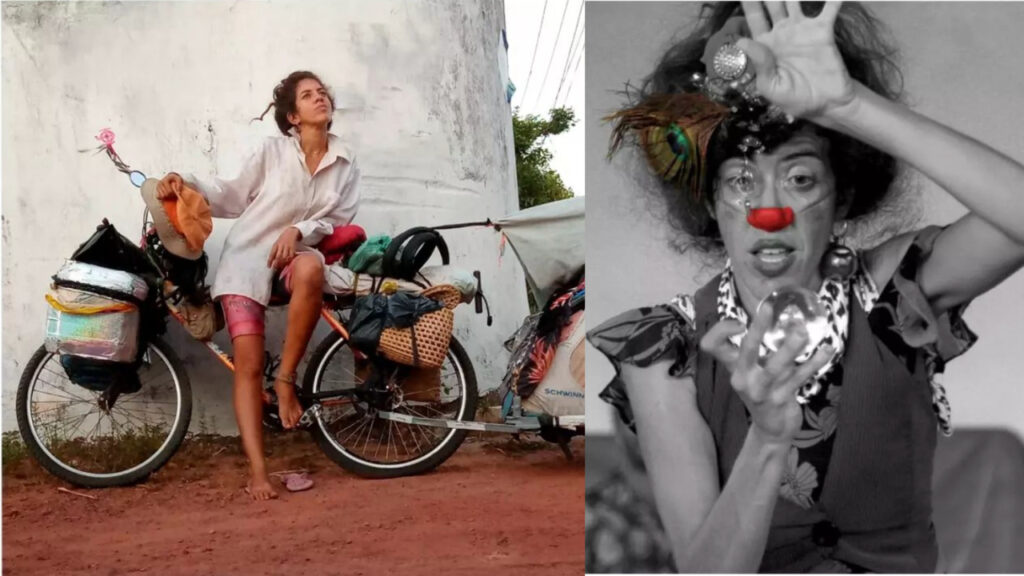
Venezuelan Artist Julieta Hernández’s Brutal Murder Sheds Light on Gender Violence in Latin America
She had been living in Brazil for eight years. She traveled by bicycle and took her circus show to as many communities as she could. However, Julieta Hernández was brutally murdered on her way to Venezuela to celebrate Christmas with her family.
Julieta thus becomes one of the first female victims of gender-based violence in Latin America in 2024.
Who was Julieta Hernández?
Julieta Ines Hernández Martínez was 38 years old and had lived in Brazil for eight years. She defined herself as a “migrant, nomad, clown, puppeteer and cyclist.”
Julieta was part of the circus artists’ collective @Circodisoladies, “an organization of comedians concerned regarding gender inequality and in search of a space for women in comedy. The artists develop presentations from improvisation and stage play.”
The artist used to travel along Brazilian roads by bicycle, taking her show to every location.
Her last contact with loved ones was just before Christmas after she set off on her trip home to celebrate the holidays with her family.
Friends and relatives of Julieta began the search
When they did not hear anything from Julieta, her friends and the organization to which she belonged began their search on social media. Two of her friends went to the area where she was last seen in early January.
“She is a Venezuelan clown, bicycle clown, and traveler. She embarked on a journey home the same way she arrived in Brazil in 2016, pedaling through various Brazilian cities,” they explained on their Instagram account when there was still hope of finding her alive.
Julieta was last seen in the town of Presidente Figueiredo, Amazonas state, 126 kilometers from Manaus, the capital. Her next report was supposed to be in Roraimanópolis, in the state of Roraima, but she did not reach the support point in that city.
On January 5, a neighbor located parts of Julieta’s bicycle and called the police. When the agents arrived, they found her body.
A barbaric outcome
According to investigations, on December 23, the victim did not find accommodation in any hostel and spent the night in a cultural residence that helps travelers passing through the municipality.
Thiago Agles da Silva, 31, and Deliomara dos Anjos Santos, 29, who are a couple, lived in the residence with the owner’s consent and charged 10 reais (about two dollars) to sleep in the hammocks outside the premises.
“Thiago stole the victim’s cell phone, who was lying in a hammock on the porch of the residence. There was a physical struggle. He strangled her and dragged her into the house. There he began to rape her,” said police commissioner Valdinei Silva in a press conference reported by Folha de Sao Paulo.
The commissioner explained that Deliomara felt jealous and doused the two with alcohol and set them on fire. While Thiago went to the hospital to treat his wounds, Deliomara hanged Julieta with a rope and buried her.
The femicide of Julieta Hernández is not just another figure. It is a symptom of a terrible reality
The press assures that the mobilization and the complaint filed by Julieta’s friends were essential to solving the case. Julieta belonged to a group called “Pé Vermêi,” which gathers artists and cyclists who travel the country by bicycle.
Julieta also founded the Red de Payas Venezolanas (Venezuelan Clowns Network). She studied Theater of the Oppressed in Brazil and maintained intense contact with social movements.
In one of her publications, she wrote of a visit to the village of Mamorana, in Brazil: “I understood that love is a choice. Traveling by bicycle, sometimes the places and their people take the place of passion, that delicious passion that I miss when I go out on the road, and that makes me smile when I walk among its memories. Sometimes, I allow myself to stay, but this requires several circumstances to help. In some places, it has happened.”
Circo di SóLadies called the murder of Julieta Hernández a femicide and expressed: “We continue to dream of a world in which women can walk without fear; children are free to play, and clowns only remove their noses when they go to rest.”
Her friends, colleagues, and various feminist organizations have organized tributes, protests, and discussions from Brazil to Chile. The message is clear: Julieta was not killed for traveling alone. Julieta was a victim of gender violence. And it must stop now.




